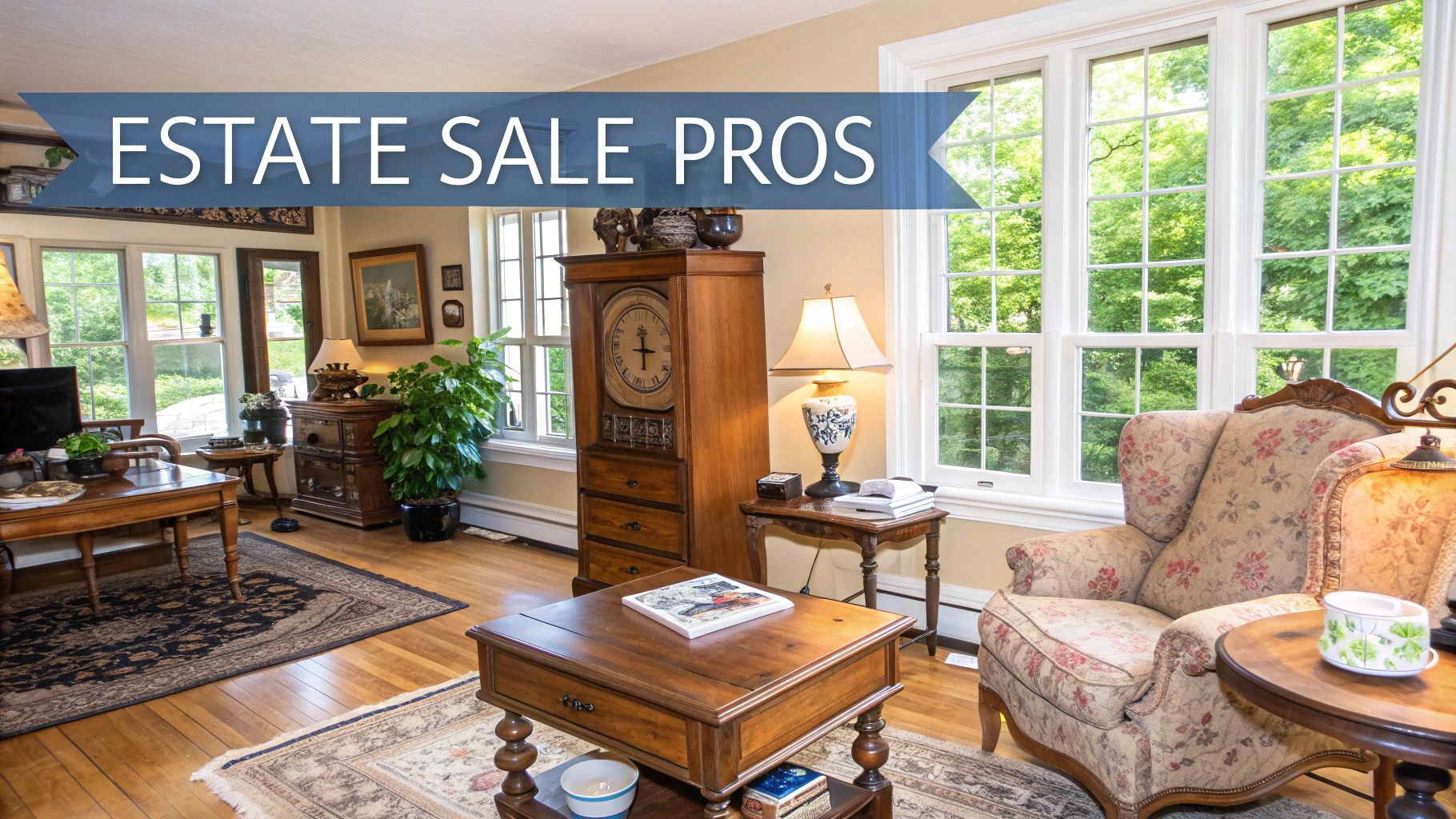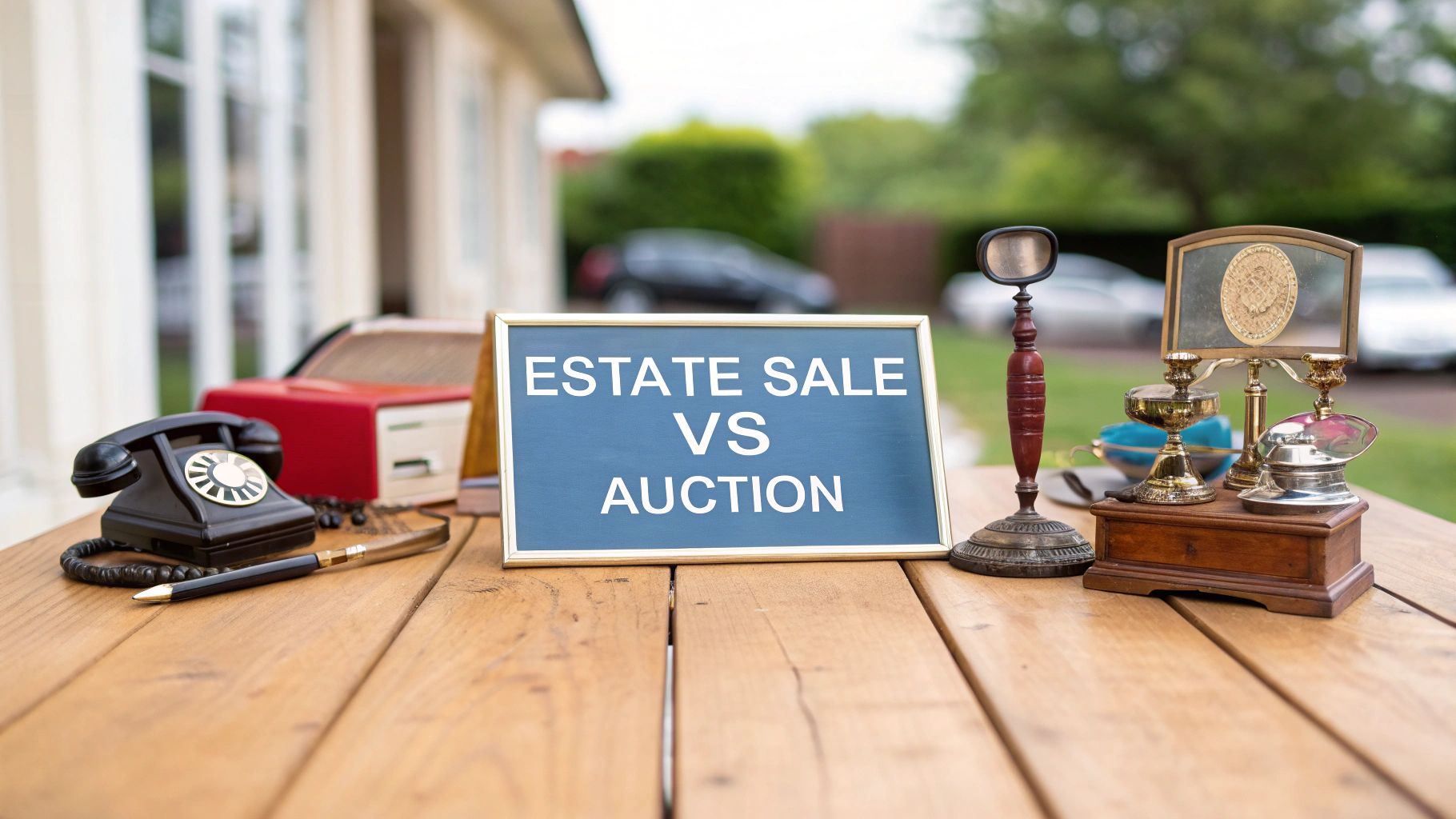When you're faced with settling an estate, one of the first big decisions is how to handle all the "stuff." The choice usually comes down to two main paths: an estate sale or an auction. Think of an estate sale as a large-scale, professionally run tag sale with fixed prices, perfect for clearing out a house full of everyday items. An auction, on the other hand, is all about competitive bidding, which can be the best way to get top dollar for rare or highly sought-after pieces.
Understanding Your Liquidation Options
Deciding how to sell off an estate's contents is a critical step in the whole settlement process. It's a choice that will directly affect your timeline, how much money you make, and frankly, your stress levels. There’s no single "best" answer; it’s about figuring out which method fits the specific items you have and what you hope to achieve.
An estate sale is pretty straightforward. A company comes into the home, puts a price tag on everything—from the sofa to the silverware—and then opens the doors to the public for a weekend. In contrast, an auction sells items one at a time (or in small groups called lots) to whoever is willing to pay the most. This can happen right at the property, at a dedicated auction house, or entirely online.
Quick Comparison Estate Sale vs Auction
At first glance, these two options might seem similar, but their core mechanics are worlds apart. These differences really matter, influencing everything from how fast things sell to the final check you receive.
Here’s a simple breakdown to see how they stack up.
| Feature | Estate Sale | Auction |
|---|---|---|
| Pricing Model | Fixed prices that get discounted over a few days. | Competitive bidding drives the price up in real time. |
| Timeline | A multi-day event, usually 2-3 days over a weekend. | A single-day event, often over in just a few hours. |
| Best For | General household contents, furniture, everyday items. | Antiques, collectibles, fine art, unique finds. |
| Sale Location | Almost always on-site at the home. | Can be on-site, at an auction house, or online. |
| Buyer Atmosphere | A relaxed "browse-and-buy" shopping feel. | Fast-paced, exciting, and driven by competition. |
Understanding these distinctions is the key to making the right call for your situation.
The real difference comes down to this: estate sales start with set prices that go down, while auctions start with a low price and let buyers push it up. One offers predictability over several days, while the other offers speed and the potential for a big payday.
Ultimately, both are just tools to get the job done. For anyone navigating the often-emotional task of settling a loved one's estate, having a clear plan is a must. Gaining a wider perspective on simplifying wills and estate planning can provide invaluable context for the entire process.
It's also a surprisingly interesting business. If you’ve ever wondered what it takes to run one of these sales, our guide on how to start an estate sale business dives into the details. In the end, the choice between an estate sale and an auction always comes back to the unique needs of the estate you're handling.
A Head-to-Head Comparison of Each Method

To really get to the heart of the "estate sale vs. auction" dilemma, you have to look past the basic definitions. The real story is in how each process plays out on the ground. The differences in pricing, timing, and even the feel of the event itself lead to wildly different results for sellers.
Ultimately, the right choice comes down to what you’re selling and what you need to accomplish. This side-by-side comparison breaks down the key factors that set these two liquidation methods apart.
Pricing Strategy: Fixed Markdowns vs. Competitive Bidding
The most fundamental difference is how things get priced and sold. An estate sale is run like a pop-up retail shop. The company does its homework, researches your items, and puts a price tag on everything—from the sofa down to the last coffee mug.
This approach gives you a sense of predictability. You know the asking price for every item before the sale even starts. The game plan relies on scheduled markdowns; prices are usually slashed on day two and even further on day three to move the remaining inventory.
An auction, on the other hand, is all about dynamic pricing fueled by competition. There's no set price beforehand. Instead, the value is "discovered" live. An auctioneer kicks things off with a starting bid and lets buyers compete, driving the price up until only the highest bidder is left.
Key Differentiator: In an estate sale, value is decided before the sale by an appraiser shooting for fair market price. In an auction, value is decided during the sale by the buyers, aiming for the absolute highest price the market will pay at that specific moment.
This competitive fire can be a huge win, especially for one-of-a-kind or in-demand items. A rare piece of art or a valuable antique might soar past its estimated value if you get two or more passionate collectors in a bidding war.
The Timeline: A Weekend Event vs. A Single-Day Sale
The timelines for these two events couldn't be more different. An estate sale is a marathon, not a sprint. It typically runs for two to three days, almost always over a weekend, to give the public plenty of time to browse.
Don't forget the prep work, which can take a week or more. The company needs time to sort through everything, stage the home professionally, and price every single item. After the sale, there’s usually a final clean-out phase for anything that didn't sell.
Auctions are built for speed. Whether it’s a live event at the property, at an auction house, or held online, the sale itself is usually over in a single day—often in just a few hours. The bidding moves fast, item after item, until the entire lot is sold.
Of course, auctions require prep time, too. Items have to be lotted, photographed, and marketed to the right bidders. But the finality of an auction day is a huge plus for anyone needing to clear out a property quickly.
Here’s a quick breakdown of how the timelines usually look:
- Estate Sale:
- Preparation: 1-2 weeks for staging and pricing.
- Sale Duration: 2-3 full days.
- Post-Sale: 1-2 days for clean-out.
- Auction:
- Preparation: 1-3 weeks for cataloging and marketing.
- Sale Duration: A few hours on a single day.
- Post-Sale: Item pickup is usually done within 1-2 days.
This contrast is a big deal. If your main goal is to empty a house with a clear, firm end date, an auction gets you there much faster. If you prefer a more relaxed process that gives the local community plenty of time to shop, an estate sale's multi-day format is a better fit.
The Buyer Experience: Browsing vs. Bidding
The vibe for buyers is completely different, which directly impacts who shows up. An estate sale has a casual, "come-as-you-are" shopping atmosphere.
People can wander through the house, pick things up, and think about their purchases. It pulls in a broad mix of local folks—curious neighbors, bargain hunters, families setting up a new home, and resellers looking for inventory.
An auction is a much more structured, high-energy event. Buyers, known as bidders, have to register to even participate. The pace is quick, and the air is thick with excitement and a sense of urgency. This environment naturally attracts more serious buyers and dedicated collectors who are often on the hunt for specific things.
Real-World Scenario Comparison
Let's put this into practice. Here are two common situations and the best approach for each:
1. The Goal: Clear out a standard three-bedroom home. The house is filled with everyday furniture, a complete set of kitchen appliances and dishes, clothes, and tools in the garage. The items are perfectly fine but aren't rare collectibles.
- Best Choice: An estate sale. It’s the perfect match. The fixed-price, retail-like model works beautifully for selling a large volume of standard household goods to a local crowd. The multi-day format gives you enough time to sell hundreds of individual items without the intense pressure of an auction.
2. The Goal: Sell a valuable, curated collection. The estate features a stunning collection of mid-century modern furniture, a couple of signed paintings, and a stash of rare vinyl records.
- Best Choice: An auction, hands down. These are niche items that will attract knowledgeable collectors. An auction, especially one with online bidding, can reach a global audience of enthusiasts who are ready to compete. This competition can drive prices far higher than a local estate sale ever could, where these specialized assets might be seriously undervalued.
Analyzing the Financial Realities of Each Choice

When it comes down to it, the choice between an estate sale and an auction often hinges on the money. It’s not just about the final number you see on paper; it's about what’s left in your pocket after everyone takes their cut. Before you commit one way or the other, you have to get a firm grasp of these financial realities, which includes understanding the potential value of your property.
The two methods have fundamentally different ways of charging for their services. Let's break down how each one works so you can make a smart decision for your estate.
Estate Sale Commission Structures
Estate sale companies almost always operate on commission. They take a percentage of the total gross sales, which means you pay nothing upfront. This commission rate isn't set in stone; it can range anywhere from 30% to 50%, depending on the size and quality of your estate.
If you're dealing with a collection of high-end art or rare antiques, you might have some wiggle room to negotiate a lower rate. For most households, though, that percentage is an all-inclusive fee. It covers everything: the initial sorting and organizing, staging the home to look like a showroom, pricing every single item, marketing the event, and staffing the sale itself. This makes your budgeting simple and clear.
The real beauty of an estate sale's financial model is its predictability. Since the company’s pay is directly tied to how much they sell, their goals are perfectly aligned with yours.
Of course, hitting the right price point for each item is crucial to maximizing what you make. If you're curious about the art and science behind it, our guide on how to price estate sale items is a great resource.
Auction House Fees and Premiums
Auctions, on the other hand, have a more layered and complex fee structure. You absolutely must read the contract line by line to see exactly what you’ll be paying for. It's rarely a single percentage.
Here are some of the common fees you'll encounter with an auction house:
- Seller's Commission: This is the percentage the auctioneer takes from the final "hammer price" of your items. It can be anywhere from 10% to 25%, sometimes more for specialized auctions.
- Buyer's Premium: This is a sneaky one. It’s a fee tacked on for the buyer to pay, usually 15% to 30% of the winning bid. While it doesn't come directly out of your pocket, savvy bidders factor this into their maximum bid, which can indirectly lower your final sale price.
- Marketing Fees: Some auction houses will charge you extra to advertise your items. This could be a flat fee or another percentage to cover catalog printing, online listings, and other promotions.
- Additional Costs: Watch out for other potential charges. These can include fees for transport, professional photography, insurance, and "lotting" (the work of grouping items together for sale).
Market Dynamics and Potential Returns
The financial outcome also depends heavily on market dynamics. Auctions create a sense of urgency and fuel competition. For that one-of-a-kind piece or a hot collectible, this can be magic, driving prices far higher than anyone expected. But this excitement comes with real risk.
If the market is soft or the right bidders don't show up, an auction can fall flat. Items might sell for well below their fair market value. For example, when oil prices crashed in Dallas, a study found that auctioned properties sold at discounts between 15% and 21% compared to traditional sales. The speed of an auction can sometimes come at the expense of a better price, especially in a shaky economy.
An estate sale offers a much more stable and predictable pricing environment. The risk isn't so much about a market downturn, but about a hidden gem being overlooked or priced too low. A top-notch estate sale company will do the research to prevent this, but you won't get that "bidding war" phenomenon that can create record-breaking prices at auction.
Ultimately, the best financial decision comes down to matching your specific assets with the sales method that is best suited to unlock their true value.
How Technology and Market Trends Impact Your Decision

The old debate of estate sale vs auction used to be simple: fixed prices or competitive bidding. Not anymore. Technology and new market trends have completely reshaped how both of these work, and understanding these changes is key to making the right choice for your situation. You’re no longer just picking a sales method; you're picking a sales strategy.
Auctions, especially, have seen a dramatic evolution. Thanks to sophisticated online bidding platforms, what was once a local affair can now be a global event. This shift has been a huge advantage for certain kinds of items.
The Rise of the Global Online Auction
If you're selling high-value, niche items—think fine art, rare coins, or specific designer pieces—online auctions have become the industry standard. Why? They put your items in front of a worldwide audience of serious buyers who are actively looking for exactly what you have. A traditional estate sale, limited by geography, just can't compete with that kind of exposure.
This global reach naturally sparks more competition, which is what you want. It's the difference between a few local collectors showing up versus bidders from multiple continents driving the price up to its true market value.
The numbers back this up. The global auction house market is projected to hit around $55 billion by 2033, a significant jump from $35 billion in 2024. This growth is fueled almost entirely by the move to online platforms that connect with a global customer base. You can get more information on this trend and discover insights into the auction market's growth.
How Estate Sales Are Adapting
While auctions have embraced a global stage, estate sales have been smartly using technology to enhance their local, in-person model. They haven’t ditched the classic weekend-long house sale, but they have woven in digital tools to make it more appealing to today's shoppers.
Here’s what you’ll see from a modern estate sale company:
- Online Previews: High-quality photo galleries are posted online well before the sale, giving buyers a chance to see what’s available and make a plan.
- Digital Marketing: They're not just putting a sign on the lawn. Companies now use social media and targeted email lists to build excitement and attract a larger, more motivated local crowd.
- Modern Payment Systems: The "cash-only" days are mostly gone. Accepting credit cards and mobile payments makes it easy for shoppers to buy more, especially larger-ticket items.
The core difference remains: auctions use technology to find global buyers for specific, high-value items, while estate sales use technology to make a local, in-person event more successful.
This is the most important takeaway. If your primary goal is to clear out a home filled with everyday furniture and household goods for the local market, an estate sale with modern marketing is likely your best bet. But if you have a handful of truly special items with international appeal, an online auction offers a much better chance at a higher financial return.
Your choice today is less about tradition and more about matching your assets to the right platform to connect with the right buyers.
How to Make the Right Choice for Your Situation

Standing at the crossroads of an estate sale vs. auction can feel overwhelming. You know the basics now—how they differ in pricing, timing, and atmosphere. But the real question is, which one is right for you?
The truth is, there’s no single "best" answer. The right choice depends entirely on what you're selling and what you hope to achieve. Let's break down how to match your specific situation to the right liquidation method.
Choose an Estate Sale for Full-Home Liquidation
Think of an estate sale as your workhorse for clearing out an entire home. If the primary goal is to sell a wide variety of standard household goods efficiently, this is almost always the best route.
Estate sales shine when you’re dealing with a large volume of general items, such as:
- Everyday furniture like sofas, bedroom sets, and dining tables
- Kitchenware, dishes, and small appliances
- Clothing, linens, tools, and books
- General home decor
The multi-day, fixed-price format is perfect for drawing a local crowd of neighbors, new homeowners, and resellers. It creates a relaxed shopping experience where hundreds of items find new homes over a single weekend. You simply can't match that kind of volume with an auction.
If you need to sell a large quantity of diverse household items with a straightforward and predictable process, the estate sale is designed for precisely that. It's built for convenience and volume.
Choose an Auction for High-Value, Niche Items
An auction is the way to go when your main goal is getting the absolute best price for a few special items. This is where you leverage the power of competition to uncover the true market value of rare or high-demand assets.
You'll want to lean toward an auction, especially an online one, when the estate includes things like:
- Fine art or signed paintings
- Antique or designer furniture
- Rare collectibles (coins, stamps, vintage toys)
- Fine jewelry and high-end watches
- Any kind of specialized collection
These aren't items for a casual browser; they demand a targeted audience of serious buyers and collectors. An auction brings those people to you, no matter where they are. That bidding war is what pushes prices far higher than you could ever hope for at a local sale.
Which Liquidation Method Fits Your Needs?
To help you decide, think about your main priority. This simple guide connects your primary goal to the most logical choice, making it easy to see which path fits best.
| Your Primary Goal | Best Choice | Why It's a Good Fit |
|---|---|---|
| Efficiently empty a whole house quickly. | Estate Sale | Perfect for selling a large volume of standard household goods to a local market in a single weekend. |
| Get the highest price for a few key items. | Auction | Connects high-value assets with passionate collectors, maximizing your return through competitive bidding. |
| A stress-free, hands-off process. | Estate Sale | Companies handle everything from pricing to clean-out for a single commission fee, offering pure simplicity. |
| Need the fastest possible sale date. | Auction | The event itself is usually over in a single day, providing a quick and definite end to the process. |
| Sell to the local community. | Estate Sale | Attracts a wide range of local buyers looking for good deals on everything from furniture to kitchenware. |
| Have unique, hard-to-value items. | Auction | The market sets the final price, which is ideal for items whose value is subjective and collector-driven. |
Ultimately, this decision will shape the entire outcome. Knowing the difference is one thing, but making the sale a success is another. To really get the most from the process, check out our estate sale tips for more expert advice.
By thinking carefully about your inventory and what matters most—speed, profit, or ease—you can move forward with confidence. That clarity is the key to a smooth and successful experience from start to finish.
Answering Your Key Questions
https://www.youtube.com/embed/6c7pZYP_iIE
Even after comparing the pros and cons of an estate sale vs auction, you probably still have a few lingering questions. It's the practical, nitty-gritty details that often make the decision for you, from what to do with leftovers to finding a company you can actually trust. Let's tackle some of the most common concerns I hear from clients.
One of the biggest worries people have is what happens if everything doesn't sell. How you handle the unsold inventory is a fundamental difference between these two approaches.
What Happens to Unsold Items?
After an estate sale wraps up, the company usually provides a "clean-out" service. Their goal is to leave the home completely empty and broom-swept, which is a huge relief for most families.
This final clean-out can happen in a few ways:
- Donation: Most of the usable items are donated to local charities. You'll typically get a donation receipt for tax purposes.
- Buyout: Sometimes, the estate sale company will offer to buy all the remaining items for a small, lump-sum payment.
- Disposal: Anything that can't be sold or donated is simply hauled away and disposed of.
Auctions have a different way of handling leftovers. If an item fails to meet its minimum or gets no bids, it’s considered "passed" or "bought-in." From there, your contract will dictate your options. You might take the item back, try it again in a future auction, or agree to sell it for a lower price.
The key takeaway is that estate sales are built to empty the house entirely, offering a true, all-in-one solution. Auctions are focused on selling individual lots, and you'll likely have to decide what to do with any pieces that don't sell.
Can I Set a Minimum Price for My Items?
It's completely normal to worry about a valuable heirloom or piece of furniture selling for far less than it's worth. Both estate sales and auctions give you a way to set a price floor, but the methods are quite different.
At an auction, you can set a reserve price. This is a secret minimum that must be reached for the item to be sold. If bidding doesn't hit that number, the item is pulled from the block. While a reserve protects you, setting it too high can stifle bidding and suck the energy out of the room.
Estate sales don't work with reserves. Instead, you and the company agree on the starting price tags for significant items before the sale begins. You have direct input on that initial value, but keep in mind that prices are almost always reduced on the second and third days to clear the house.
How to Find a Reputable Company
Picking the right company is, without a doubt, the most critical decision you'll make. A great partner will get you the best possible return and make the entire process feel manageable. A bad one can turn it into a nightmare.
When you're vetting companies, here’s what I recommend:
- Check Credentials and Reviews: Look for established businesses with a solid history in your area. Read online reviews and see if they belong to professional groups like the National Auctioneers Association (NAA) or the American Society of Estate Liquidators (ASEL).
- Ask for References: A professional company that's proud of its work will happily connect you with past clients. Don't be afraid to ask.
- Understand the Contract: Never, ever sign a contract without reading every word. It needs to clearly spell out commission rates, fees, what services are included, and when you'll get paid. Make sure there are no surprises.
Taking these steps is the best way to ensure you have a transparent, profitable, and stress-free experience.
Navigating the world of antiques and valuables can be complex, but you don't have to do it alone. With the Curio app, you can get instant identification, historical context, and an estimated appraisal for your items right from your phone. Snap a photo to uncover the story behind your treasures and make informed decisions with confidence. Download Curio today at https://www.curio.app.
